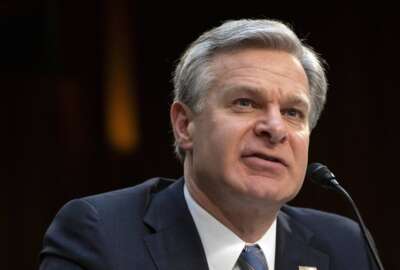Air Force program succeeds in bringing bases, communities together
Steven W. Zander leads the Air Force Community Partnership, which helps bases and local communities reach mutually beneficial agreements on services and facilities.
Steven W. Zander is leading the Air Force’s effort to partner with support services and facilities around its bases to find savings while meeting its essential mission activities.
The Air Force Community Partnership program has helped 48 bases reach agreements with their surrounding communities. Services include refuse collection, wastewater treatment, snow removal and library services. The program has identified more than 1,000 sharing arrangements to date.
“Steven has helped the Air Force and the bases think differently,” said Miranda Ballentine, the Air Force assistant secretary for installations, environment and energy. “It used to be that bases were mini-cities in terms of all the municipal services they provide. Steven has an entire team that goes to the bases and has a clear process to brainstorm ways to best utilize base and local community money and expertise.”
An example of the program’s success can be seen at Seymour-Johnson Air Force Base in North Carolina, where the installation and community are working together to build a shared sports complex on Air Force property.
“There was one example where a county had a stipulation in its local code that forbids it from doing road work on federal lands,” said Timothy Bridges, the deputy assistant secretary of the Air Force for installations. “Steven’s team facilitated the base and county working together, resulting in the county rewriting the ordinances.”
For the leadership he has provided to the Air Force Community Partnership program, the Partnership for Public Service named Zander a finalist for the 2015 Management Excellence Medal. The award honors federal employees who demonstrate superior leadership and management.
Getting to know Steven W. Zander
Federal News Radio asked each of the Sammies finalists questions about themselves. Here are Zander’s responses:
What three words best describe your leadership philosophy? Hard to say in three words.
How about five? Micromanage the keys to success. As a young lieutenant, I read the book “The Right Stuff” about the U.S. astronaut program. The astronauts were all successful leaders in their own right and they all had one thing in common. They realized they could not micromanage everything so they learned to delegate programmatic matters but identified then “micromanaged the keys to success.”
What’s the best piece of advice (or words of wisdom) you’ve ever received and who gave it to you?
Listen. Even if you know the answer to question. Listen to how others respond and you often will learn something.
My father provided it to me as a young laborer on a construction crew. I realized I knew little about how a construction crew operated.
Who is your greatest role model and why?
Role models have changed over time. My earliest heroes were members of construction crews. Many had fought, seen and experienced life changing events during the Vietnam War. They had a working knowledge of international and domestic affairs. They met life’s challenges with a great sense of humor; they lived and breathed a patriotic spirit.
What’s the last thing you read and what’s next on your reading list?
Last Read: “Duty: Memoirs of a Secretary at War” by Robert M. Gates, former Secretary of Defense.
Net Read: ” Collaboration Nation” by Mary Scott Nabors
Who would you most like to have lunch with and why?
Robert M. Gates. I like his attitude about public service. He was the president of Texas A&M, a job he thoroughly enjoyed. He saw graduates of Texas A&M going off to war; some giving their lives. When offered the job as SECDEF, he felt he had to take the job for many reasons, a major one being he wanted to help protect the interests of American soldiers.
The Management Excellence Medal is just one of the Samuel J. Heyman Service to America Medals (Sammies) presented annually by the Partnership for Public Service. View a photo gallery of all the Sammies nominees.
Copyright © 2024 Federal News Network. All rights reserved. This website is not intended for users located within the European Economic Area.
Michael O’Connell is senior digital editor of Federal News Network optimizing content for the best user experience. Follow @moconnellWFED
Follow @moconnellWFED






